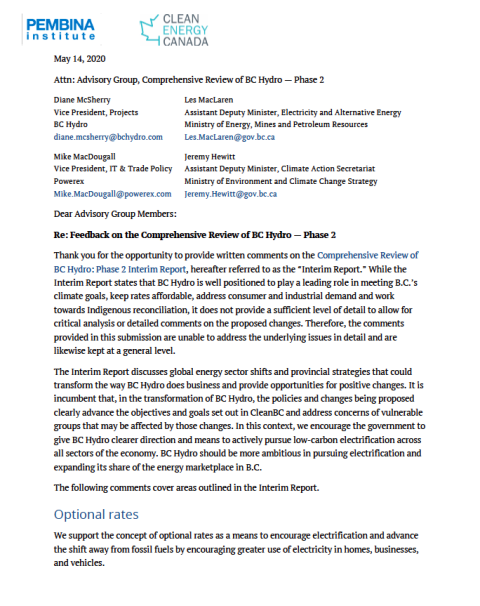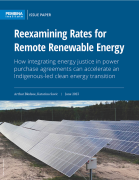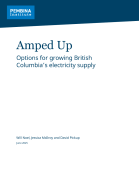The Pembina Institute and Clean Energy Canada sent the following letter to the Advisory Group for Phase 2 of the Comprehensive Review of BC Hydro:
May 14, 2020
Attn: Advisory Group, Comprehensive Review of BC Hydro — Phase 2
Diane McSherry
Vice President, Projects
BC Hydro
diane.mcsherry@bchydro.com
Les MacLaren
Assistant Deputy Minister, Electricity and Alternative Energy
Ministry of Energy, Mines and Petroleum Resources
Les.MacLaren@gov.bc.ca
Mike MacDougall
Vice President, IT & Trade Policy
Powerex
Mike.MacDougall@powerex.com
Jeremy Hewitt
Assistant Deputy Minister, Climate Action Secretariat
Ministry of Environment and Climate Change Strategy
Jeremy.Hewitt@gov.bc.ca
Dear Advisory Group Members:
Re: Feedback on the Comprehensive Review of BC Hydro — Phase 2
Thank you for the opportunity to provide written comments on the Comprehensive Review of BC Hydro: Phase 2 Interim Report, hereafter referred to as the “Interim Report.” While the Interim Report states that BC Hydro is well positioned to play a leading role in meeting B.C.’s climate goals, keep rates affordable, address consumer and industrial demand and work towards Indigenous reconciliation, it does not provide a sufficient level of detail to allow for critical analysis or detailed comments on the proposed changes. Therefore, the comments provided in this submission are unable to address the underlying issues in detail and are likewise kept at a general level.
The Interim Report discusses global energy sector shifts and provincial strategies that could transform the way BC Hydro does business and provide opportunities for positive changes. It is incumbent that, in the transformation of BC Hydro, the policies and changes being proposed clearly advance the objectives and goals set out in CleanBC and address concerns of vulnerable groups that may be affected by those changes. In this context, we encourage the government to give BC Hydro clearer direction and means to actively pursue low-carbon electrification across all sectors of the economy. BC Hydro should be more ambitious in pursuing electrification and expanding its share of the energy marketplace in B.C.
The following comments cover areas outlined in the Interim Report.
Optional rates
We support the concept of optional rates as a means to encourage electrification and advance the shift away from fossil fuels by encouraging greater use of electricity in homes, businesses, and vehicles.
While the Interim Report advances residential time-of-use pricing as optional (“opt-in”), we encourage further reflection on whether this could form the default rate as long as it is supported by safeguards for low-income households. These safeguards should ensure that low-income households are not penalized for being unable to benefit from a time-of-use rate or to invest in upgrades to heating systems or appliances.
Furthermore, allowing for optional interruptible rates and incentives, such as discounted rates for heat pumps, is a positive step forward and should be accompanied by additional energy efficiency and conservation programs and by providing more cost-effective electrification options. This includes a move to flat rates for residential and business customers which, if adopted, must be structured in ways that do not undermine BC Hydro’s ability to raise sufficient revenue.
Flattening the two-tier industrial rate
While encouraging electrification in industry is key to lowering carbon pollution in this sector, flattening the two-tier industrial rate as described, to be competitive with the cost of natural gas, is concerning in the absence of robust plans for conservation measures. Simply flattening rates without having a program to encourage or incentivize conservation, as the two-tier rate was designed to do, may allow for continued use of less efficient equipment or processes. Conservation incentives must be included in any plans to flatten rates to ensure that electrification also encourages efficiencies. Greater electrification of industry, which requires a substantial increase in electricity load, must be achieved in a way that supports CleanBC and emissions reduction goals for 2030 and beyond. It is also unclear how the cost and financing of additional infrastructure to connect industry will be addressed.
While the price of natural gas is expected to remain relatively low in the medium term, the cost of providing transmission infrastructure to connect industry can be substantial and will need to be financed by some means, which could lead to additional costs to ratepayers. Therefore, we encourage government to develop options for how these industrial rate changes could be financed.
Several questions remain, such as:
- Does increasing load at a subsidized rate increase revenues to a sufficient level?
- Is incentivizing the price of electricity the primary factor in an industrial customer’s decision to move to electrification?
- Is there a phase-out period for subsidies for industry that reduce the gap with natural gas prices?
Given that the use of natural gas is expected to decline over the long term, pricing mechanisms should reflect the need for a consistent long-term carbon price signal and complementary policy actions, including methane regulations, to ensure that gas prices reflect the true cost of the fuel.
Barriers to electrification
While the Interim Report addresses the barriers industrial customers face with respect to the time and cost to connect to BC Hydro’s system, it does not address means to streamline processes or reduce costs for residential or commercial customers that may face similar connection barriers. The cost of service upgrades is also a barrier for residential and commercial customers that seek to install electric heat pumps and/or electric vehicle charging stations. Incentives and/or programs to support electrification and service upgrades should be implemented for residential and commercial customers that face cost barriers. This is also the case for northern and remote communities that rely on diesel or other fossil fuels for power (see recommendations below).
Internal price for carbon
We are supportive of an internal carbon price to guide BC Hydro’s decision-making.
At the same time, greater detail, including how this internal carbon price is determined, is needed to fully understand its application to investments such as vehicles and building operations, and the feasibility of applications to other types of projects. Climate policies and pricing systems currently in place are not sufficient to recognize the true costs or impacts of climate change. We urge BC Hydro to consider an internal carbon price that includes both a market and social cost for carbon and to apply it more broadly to its projects and initiatives.
Investment in innovation
While the use of technology and innovation are important to maintaining a modern grid system, further investments in innovation should consider the costs and benefits of in-house innovation versus the adoption of commercially available (or near-commercial) technologies developed by the private sector.
In addition, a mechanism to allow for the inclusion of self-generation of electricity, for example from rooftop solar and wind resources, should be a part of BC Hydro’s long-term planning.
Removal of the self-sufficiency requirement
In general, we are supportive of removing the self-sufficiency requirement. However, there must be safeguards in place to ensure that any imported electricity is clean and that expected future growth in electricity demand is considered.
Transparency is needed to differentiate the amounts of electricity imported as “clean” (with clear definitions that determine designation as such) from any that is offset by credits as a result of exporting BC Hydro’s electricity to other jurisdictions. In addition, there must be transparency around the calculation of cost benefits to forego local generation and infrastructure investments and potential local economic development opportunities, in particular in Indigenous and rural communities, for the purchase of electricity on the open market. The security of electricity supply and particularly protection against increased costs due to wide fluctuations in market prices should be addressed prior to removing the self-sufficiency requirement. This is especially important given there is also a desire to increase load through the electrification of industry, which we support, but changes should be structured in a way to meet CleanBC and carbon reduction goals to 2030 and beyond.
Implementation of a 100% clean electricity standard
In principle, the implementation of a 100% clean electricity standard is a positive step forward. However, areas that require further clarification include:
- Clearly defining what is considered and certified as clean electricity
- Ensuring that credits for imported clean electricity are not double counted by other groups or jurisdictions
- Managing substantial impacts on rates for vulnerable groups
- Identifying any effects or barriers to achieving the objective to close the gap in pricing with natural gas for industrial electrification
Opportunities for Indigenous Nations
In 2019, B.C. passed legislation to implement the United Nations Declaration on the Rights of Indigenous Peoples, mandating the alignment of provincial laws with the principles of reconciliation, including the right for self-determination. This means that the provincial government is committing to, and responsible for, removing undue barriers that prevent First Nations from participating equally in the energy market. Providing competitive clean energy options to remote Indigenous communities is critical to their self-determination, and should include comprehensive consultations with Indigenous Nations on:
- Independent power producer opportunities to allow clean energy generation, grid integration, and long-term income generation through the re-opening of the Standing Offer Program process for Indigenous proponents
- Ownership of energy generation resources and infrastructure
- Unrestricting Indigenous utilities’ access to BC Hydro’s transmission system
- Mechanisms to encourage the development of further economic partnerships between incumbent utilities and First Nations
The recently released Final Report of the BC Utilities Commission’s Indigenous Utility Regulation Inquiry makes some positive recommendations to the Government of B.C. around the inclusion and prioritization of economic opportunities for Indigenous communities and businesses to operate their own utilities. However several questions remain and will require further commentary. This Inquiry and the recently legislated Declaration on the Rights of Indigenous Peoples Act are positive steps toward acknowledging Indigenous rights in B.C and supporting economic reconciliation, and we urge BC Hydro to refer to this work as a potential model for future engagement.
Conclusion
In summation, the Interim Report only provides a high-level outline of significant changes to several areas of BC Hydro’s business model. Details on those changes, new programs, and policies that may mitigate negative effects on stakeholder groups are not addressed, and these details — which we anticipate will be covered in the final report — will warrant additional consultation prior to decisions being taken by the government or BC Hydro. The changes identified in the Interim Report, if executed thoughtfully, have the potential to bring positive changes to BC Hydro, uphold the commitment to meet CleanBC objectives, and allow BC Hydro to lead the way to greater electrification of energy use in the province.
Yours sincerely,
Karen Tam Wu
Regional Director, B.C.
Pembina Institute
Merran Smith
Executive Director
Clean Energy Canada, Morris J. Wosk Centre for Dialogue, Simon Fraser University









